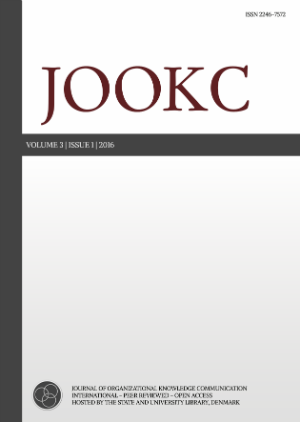Experience Sampling as a Method for Studying In Situ Organizational Communication
DOI:
https://doi.org/10.7146/jookc.v3i1.24348Keywords:
Communication, knowledge, organization, ECR, event contingent recording, in situ communication, experience samplingAbstract
The communication flows in organizations seem to be in constant state of flux, and this is particularly true when thinking about how the various strategies and mediated practices people use to interact with peers. As organizations work to establish healthy communication workflows, they need insight into how communication around projects exists in situ (i.e., as it happens in the moment) to better understand and support the employee experience so work can get done. The employee experience with communication across different events, settings, and ideologies plays an important role in meeting the intended outcomes of project work, and learning about the in situ communication practices of teams and individual employees remains an important consideration for organizational researchers. This article describes a method for studying in situ communication in the workplace called experience sampling. The goal for this article is to explain how experience sampling can be used to study communicative events in the workplace by drawing from two datasets of original research. From the use of experience sampling depicted in these case studies, the article indicates lessons learned about using experience sampling to study worker’s in situ communication in the workplace.
Downloads
Published
How to Cite
Issue
Section
License
§1. Object of the agreement and rights
The author guarantees that she/he has the copyright to the work and that this specific publishing does not offend other persons’, organizations’ or companies’ copyright.
- 1.1. The author gives the Journal of Organizational Knowledge Communication a non-exclusive right to publish the work in the electronic version of the non-commercial journal The Journal of Organizational Knowledge Communication. This journal is an open access journal and will be available for free on the internet and as thus available for all internet users worldwide. The work will be published in English.
- 1.2. The journal is published under a Creative Commons license Attribution Non-commercial No derivatives (cc by-nc-sa) http://creativecommons.org/about/license/. This license allows others to download your work and share it with others as long as they mention you and link back to you, but they can’t change it in any way or use it commercially.
- 1.3. The author is the copyright holder and the author agrees to the above mentioned Creative Commons license.
- 1.4. The Journal of Organizational Knowledge Communication is not entitled to transfer the obtained right in this agreement to a third party.
§2. Publishing on the Internet
The Journal of Organizational Knowledge Communication is under an obligation to publish the work within a reasonable time span and within the first year after the manuscript has been accepted for publication. The Journal of Organizational Knowledge Communication is entitled to use the work or parts of the work for marketing purposes.
§3. Proofreading
The Journal of Organizational Knowledge Communication is edited, peer reviewed and proofread by the editors and the international peer review board in collaboration with the author.
§4. Availability on the Internet
The article will be published on the Internet at www.jookc.com.





